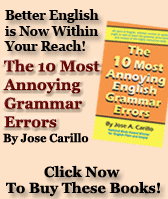- HOME
- ENGLISH FORUM
- BADLY WRITTEN, BADLY SPOKEN
- GETTING
TO KNOW ENGLISH - POUR OUT YOUR MIND IN ENGLISH
- GOING DEEPER INTO ENGLISH
- YOU ASKED ME THIS QUESTION
- EDUCATION AND TEACHING FORUM
- ADVICE AND DISSENT
- MY MEDIA ENGLISH WATCH
- NOTABLE WORKS BY OUR VERY OWN
- ESSAYS BY JOSE CARILLO
- ABOUT JOSE CARILLO
- READINGS ABOUT LANGUAGE
- TIME OUT FROM ENGLISH GRAMMAR
- NEWS AND COMMENTARY
- BOOKSHOP
- ARCHIVES
ESSAYS BY JOSE CARILLO
On this webpage, Jose A. Carillo shares with English users, learners, and teachers a representative selection of his essays on the English language, particularly on its uses and misuses. One essay will be featured every week, and previously featured essays will be archived in the forum.
Watch out for those tricky contronyms or antagonyms!
The English language has its generous share of words that can mean the opposite of themselves. Such words, for which some grammar pundits have coined the terms contronyms and antagonyms*, include “bound” (which could mean either “moving” or “tied up”), “cleave” ( “to cut,” “to seal together”), citation (“award for good behavior,” “penalty for bad behavior”), “oversight” (“error from carelessness,” “watchful care”), “fast” (“moving rapidly,” “fixed in position”), and “ravished” (“raped,” or “overcame by delight”). They obviously could give us trouble if we aren’t careful enough, so it pays to be watch out for their skulking presence in the language.
As I’m sure you’ll remember now, one very commonly used contronym is “presently,” which could either mean “at present” or “very soon.” I confess that I often catch myself about to utter it to mean “at present”—this stands to reason from its spelling and sound—but some dialogue in a British movie in my mind stops me on my tracks and quickly redirects me to a safer word like “now” or a tamer phrase like “at this time.”
So precisely how do we use “presently” with the least danger of embarrassing ourselves? Or would it be wise to avoid using this tricky word together and use one of its more reliable and surefire synonyms? In the essay below that I wrote for my “English Plain and Simple” column at about this time last year, “Is ‘presently’ present or future?”, I offer some prescriptions and caveats for dealing with that slippery adverb without earning a reputation for being English-challenged.
*Contronyms, antagonyms. Both of these nouns are still neologisms, or new words whose existence is not yet acknowledged by the mainstream dictionaries. From what I can gather, the term "contronyms" was coined by Richard Lederer in his book Crazy English; Jim Ellis, in his family website, lays claims to having coined the term “antagonym.”
Click on the title below to read the essay.
Let’s settle this vexing word-choice problem once and for all: Do we use the adverb “presently” to mean “at present” or “very soon”? I realize that I had already taken a position on this matter years before in this column—that the word should mean “very soon” and not “at present”—and I must admit that when I’m copyediting manuscripts, I always itch to change “presently” to “now” when the author had obviously used the word in that sense, as in “The couple presently lives in a charming little apartment.” But then, when I watch a British movie with snotty butler telling snotty master “I’ll be with you presently, sir,” I’m absolutely sure that the word means “very soon” instead.
The truth of the matter is that “presently” has two acceptable senses in current usage: “currently” or “at the present time,” and “very soon” or “in a short time.” The neologisms “antagonym” and “contranym” have been coined for words like this, which could sometimes mean the opposite of itself. At any rate, The American Heritage Book of English Usage says that “at the present time” or “currently” was actually the original sense of “presently,” one that dates back to the late 14th century. For some reason, though, the usage seems to have disappeared from the written record in the 17th century. This disappearance, my digital Merriam-Webster’s 11th Collegiate Dictionary implies, was probably what prompted the authoritative Oxford English Dictionary to declare in 1909 that that sense of the word had become obsolete—even as the OED observed that the sense remained in regular use in most English dialects.
Since then, some language critics have became biased against the “now” sense of “presently,” declaring it erroneous usage. They insist that “presently” should be used only in its primary sense of “soon” or “in a short time.” In fact, according to The American Heritage Book of English Usage, only 50 percent of its Usage Panel found the “now” sense of “presently” acceptable. (In one recent official count, the Usage Panel had 180 members, including such notables as Jacques Barzun, educator; Alfred Kazin, English professor; Henry Louis Gates Jr., humanities professor; Anne Tyler, Margaret Atwood, and Pat Conroy, novelists; Paul Theroux, travel writer; and William Zinsser, writer-editor.) This, of course, puts sentences like “The 29th Olympics is presently being held in Beijing” in serious jeopardy. Indeed, it’s obvious that if the Usage Panel had their way, they’d rather restate that sentence as “The 29th Olympics is [now, at present, currently] being held in Beijing.”
I must admit that it was the collective judgment of all these English-language notables that had persuaded me to take a firm position in this impasse. I’m not saying that the “now” sense of that word is incorrect, but being not a native English speaker and not bound by a particular English dialect, I’d rather rely on how professional users of American English perceive the meaning of a word than on simple dictionary meaning or anecdotal evidence.
Thus, to avoid confusing myself and my readers, I would never use “presently” in this sense: “They are presently in Boracay Beach on their honeymoon.” Hands down, I would use “now” as first option, and perhaps use “at present” only if I have already used a lot of “nows” in preceding sentences. As to “currently,” I’d shy away from it because the word sounds to me too officious for comfort. These, too, would be my advice to writers who until now are unsure of how to deal with “presently.”
One more question needs to be answered, of course: When do we use “presently” to mean “very soon,” if at all? Well, perhaps when we’re in London to visit the Queen, and the cab driver is badgering us to hurry up while we’re buying some souvenirs, we can tell him with absolute nonchalance: “Just you wait. I’ll be with you presently.”
From the weekly column “English Plain and Simple” by Jose A. Carillo in The Manila Times, Saturday, August 16, 2008 issue © 2008 by the Manila Times Publishing Corp. All rights reserved.
----
Previously Featured Essay:
One grammar error I frequently encounter in my work as a copy editor is the misuse of the preposition “between” in the sense of setting the limits or endpoints of a range. This usage of “between” being so basic in English (as in “between you and me” and “between heaven and earth”), I used to think that getting it wrong was simply due to oversight by the writer or to what we might charitably call a typing error. But over the past three years or so, my coming across this grammar transgression much too often has convinced me that there’s actually more to the problem than meets the eye.
Consider the following sentences (I have changed some particulars to protect the identity of the writers): “Putting up a water refilling station requires an initial capital outlay of anywhere between P600,000 to P1.1 million.” “Plain chocolate contains between 30 percent to 70 percent cocoa solids.” “Each shop can carry between 1,000 to 1,800 items, with groceries comprising the bulk of its sales.” “The tunnel provided the perfect setting for the locals, who could only go partying between 8 a.m. to 4 p.m. because of the curfew.” “The estimated investment recovery period for the restaurant is between one to three years.” “His distributorship moves between 1,000 to 2,500 units a month.”
In all of the six “between”-using sentences above, of course, the grammatically acceptable usage is not “between _______ to_______” but “between _______ and _______” instead: “Putting up a water refilling station requires an initial capital outlay of anywhere between P600,000 and P1.1 million.” “Plain chocolate contains between 30 percent and 70 percent cocoa solids.” “Each shop can carry between 1,000 and 1,800 items, with groceries comprising the bulk of its sales.” “The tunnel provided the perfect setting for the locals, who could only go partying between 8 a.m. and 4 p.m. because of the curfew.” “The estimated investment recovery period for the restaurant is between one and three years.” “His distributorship moves between 1,000 and 2,500 units a month.” This is because in all of the six sentences, the “between”-phrase is describing not the range itself but a point somewhere within that range.
Now, for those who’d rather use “to” because they feel queasy using “and” as go-between for the endpoints of the range, there’s a perfectly acceptable alternative: get rid of “between” and replace it with the preposition “from,” and, if possible, get rid of “from” itself afterwards. The original five sentences will then read as follows: “Putting up a water refilling station requires an initial capital outlay of anywhere from P600,000 to P1.1 million.” “Plain chocolate contains from 30 percent to 70 percent cocoa solids.” “Each shop can carry 1,000 to 1,800 items, with groceries comprising the bulk of its sales.” “The tunnel provided the perfect setting for the locals, who could only go partying from 8 a.m. to 4 p.m. because of the curfew.” “The estimated investment recovery period for the restaurant is one to three years.” “His distributorship moves 1,000 to 2,500 units a month.”
Note that the third, fifth and sixth sentences above did away with “from” and are none the worse for it. In all six sentences, though, it’s clear that the phrase at hand is describing not a particular point within that range but the range itself.
There’s one other thing to make sure of when converting an erroneous “between _______ to _______” phrase to a “from _______ to _______” phrase in which the endpoints are dates: don’t change the “to” to a hyphen. When correcting, say, “The business flourished between 1995 to 2007, then floundered during the 2008 economic meltdown,” avoid reconstructing the sentence as “The business flourished from 1995-2007, then floundered during the 2008 economic meltdown.” For clarity and elegance in construction, always spell out the “to”: “The business flourished from 1995 to 2007, then floundered during the 2008 economic meltdown.”
From the weekly column “English Plain and Simple” by Jose A. Carillo in The Manila Times, November 15, 2008 issue © 2008 by the Manila Times Publishing Corp. All rights reserved.
----
Click to read more essays (requires registration to post)







